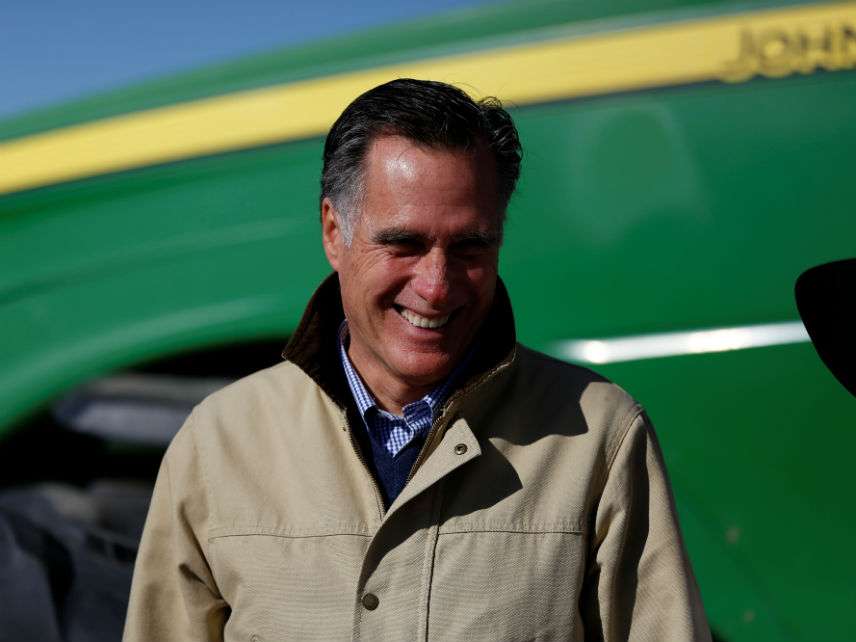Mitt Romney Reminds Us That Trump Isn't as Extreme on Immigration as the 2012 GOP
Even our restrictionist president has yet to go full Romney.

As Elizabeth Nolan Brown pointed out this morning, U.S. Senate candidate for Utah and 2012 GOP presidential nominee Mitt Romney told an audience in Provo Monday that he has been "more of a hawk on immigration than even the president." This is true and worth reflecting on, particularly for anti-illegal-immigration hardliners.
In Q&A and a follow-up clarification, Romney indicated that his policy approach has changed somewhat toward U.S. residents who were brought here illegally as children, around 800,000 of which were entered into the Deferred Action for Childhood Arrivals (DACA) program launched by the Obama administration in 2012. "My view [in 2012] was these DACA kids shouldn't all be allowed to stay in the country legally," Romney said. "Now, I will accept the president's view on this [in 2018], but for me, I draw the line and say, those who've come illegally should not be given a special path to citizenship." Later, the campaign shared the candidate's certification document, which states, "Specifically, I believe the Deferred Action for Childhood Arrivals (DACA) individuals should be given legal status."
It's worth pointing out that candidate Donald Trump was talking about not just deporting DACA kids, but deporting U.S.-citizen children of adult legal immigrants, so the president's current position, whatever it exactly is, represents considerable softening compared to his campaign rhetoric. But so does Mitt Romney's.
The 2012 Republican Party Platform makes it plain: "[W]e oppose any form of amnesty for those who, by intentionally violating the law, disadvantage those who have obeyed it. Granting amnesty only rewards and encourages more law breaking." Giving DACA kids relief from deportation is an amnesty, by any reasonable definition of the word. So why did Trump and Romney change their minds?
Public opinion could play a role—support for continuing DACA and/or not deporting illegal-immigrant children consistently polls at 66 percent or higher, depending on the wording. But there's another lesson lurking in plain sight: Conservative immigration rhetoric, long before Donald Trump, has been writing checks that simply cannot be cashed in the real world.

As George Will pointed out in 2013, after a Romney loss that many people at the time (including Donald Trump) blamed on the candidate's "maniacal" (in Trump's words) immigration platform, deporting every illegal immigrant from the United States "would require a line of buses bumper-to-bumper extending from San Diego to Alaska. Not going to happen. And as soon as people come to terms with that, then we get on to settling it." Then-candidate Gary Johnson made a similar point in 2016: "Rounding up more than 11 million people—a population larger than all but the 7 largest states in the union—is a ludicrous notion to begin with. Everyone knows it, including Donald Trump. It was a lie cloaked in a promise."
So President Trump will eventually produce some form of "amnesty" that he explicitly ran against, as a President Romney would have had to despite running not one but two campaigns tarring all his opponents with the A-word. And these are hardly the only undeliverables in conservative immigration rhetoric.
Romney in 2012 wanted to deny federal funding not only to sanctuary cities (which the Trump administration is discovering runs up against the U.S. Constitution) but also to "universities that provide instate tuition rates to illegal aliens," something I don't think Trump has even broached (though it, too, would likely be quashed in court). Romney also wanted to complete the physical barrier on the southern border, though only in "double-layered fencing," and paid for by the Treasury, not a theoretical Mexico.
Immigration restrictionists do not want to hear that their policy goals are unattainable; they would rather complain that the politician who campaigned on them then failed to deliver was just another sellout to Big Open Borders. (For those with a refined taste in crocodile tears, I recommend reading about the recent spurned-lover conversation about Trump's immigration shortfalls with former champions Ann Coulter and Mickey Kaus.)
But the truth is, we cannot "seal our borders," we cannot magically wave away birthright citizenship, we cannot track foreign visitors like FedEx packages, nor do most of the things Republican politicians now routinely promise on the issue. Until conservatives confront the logistical and constitutional obstacles to their enforcement fantasies, we will be at a policy impasse.
The same goes for Democrats' mirror-image fantasia on the issue, which begins with their very recent conversion to the gauzy idea that you can protect at least five million illegal immigrants from deportation without incentivizing new illegal immigrants to come right behind them. By preemptively ruling out most any status-pathways between deportability and citizenship, they have not only helped make what should be a more fluid flow of workers go back and forth across the borders, but have encouraged Republicans to look upon immigration policy as a zero-sum contest for votes.
The immigration paths of the two major parties have only recently diverged, and much of what they still do agree on (like the E-Verify system) is intrusive and wrong. If there is to be any hope for a post-post-truth policy discussion about illegal immigrations, it should properly begin by subjecting the dilemma to a prohibition analysis, rather than screwing the bolts ever tighter on Fortress America. Until that day, let's subject both Team Red and Team Blue to some audio-visual mockery:


Show Comments (75)